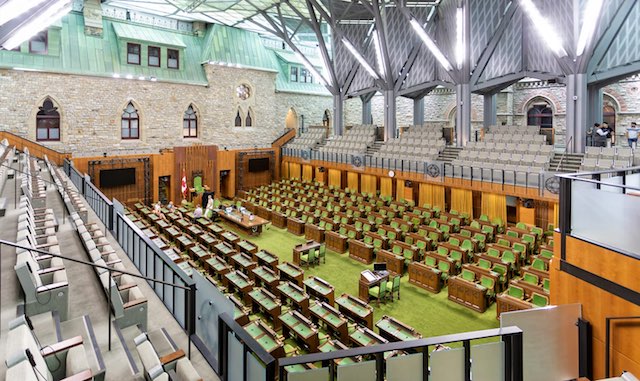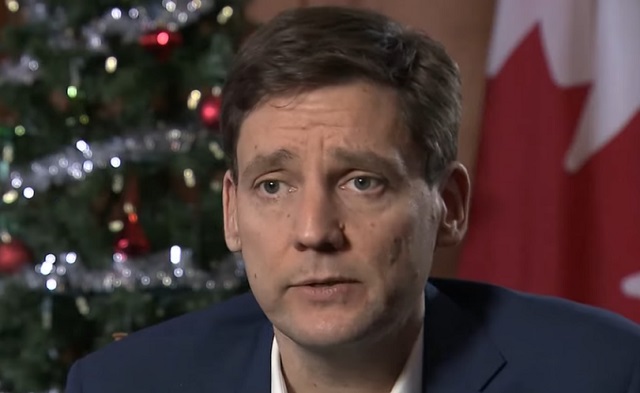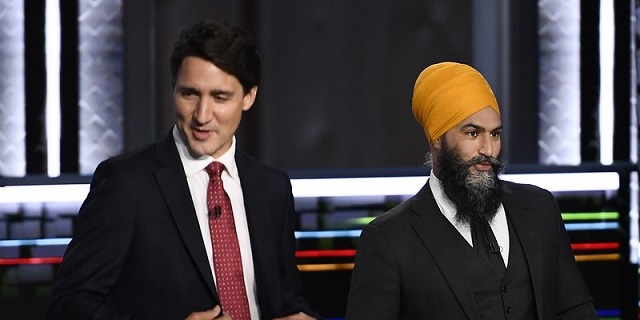Opinion
Paul Wells: A poor choice of venue

From Paul Wells on Substack
The Liberals wanted to beat Pierre Poilievre in the House of Commons. No such luck.
On Pierre Poilievre’s first day as leader of the Opposition, eleven months ago, the Liberals’ best available minister sought to frame the battle ahead.
“We are going to see two competing visions over the course of this session,” Randy Boissonnault said, largely ignoring Poilievre’s first question.
“The first is our government’s plan to support Canadians and those who need it most. The second is that of the Conservative Party and members of Parliament who would leave Canadians to their own devices.”
Boissonnault’s answer struck me at the time as the best available information about the Trudeau Liberals’ plan for Poilievre. It’s worth revisiting.
Paul Wells is a reader-supported publication. To receive new posts and support my work, consider becoming a free or paid subscriber.
At the time, late in September 2022, Poilievre had won a resounding victory over the rest of the Conservative leadership field. The Trudeau government had an opportunity to influence votes’ perceptions of the Liberals’ latest opponent. Many observers assumed the Liberals would do this through some sort of ad campaign, as Stephen Harper had done against Paul Martin, Stéphane Dion and Michael Ignatieff, and tried to do against Trudeau, always well ahead of an election.
Boissonnault was announcing the Liberals wouldn’t do this. The main parties’ “two competing visions” would become clear throughout “this session,” in the venue where life is divided into sessions: Parliament. (My procedure-wonk friends will remind me that a “session” isn’t a school year, it’s the space between a Throne Speech and a prorogation or dissolution. Still, a year is a good time for an interim check-in, and plainly things are happening.)
I’m going to say it hasn’t gone well for the Liberals. A stack of polls tells me so, but we don’t only need polls. The Cabinet has gathered in Charlottetown to hear from an academic who calls the state of housing in Canada “a crisis.”Meanwhile the guy who ran economic policy for Justin Trudeau’s government for seven years is calling affordable housing “the urgent economic need of today.” Imagine how many urgent economic needs we’ve heard about since 2015. Maybe the urgent economic need all along was to resist the urge to treat every need as urgent. Anyway the Liberals expected they could govern by picking issues that would work to their advantage. Instead an issue has been picked for them.
Poilievre made no secret of his own plan to use housing shortages to illustrate “two competing visions.” Every time he stood that day he repeated that housing prices had doubled under Trudeau. Boissonnault’s response was, in some cases, to ignore the question (“Mr. Speaker, let us talk about how people can pay their bills with our new dental plan”) and in others, to mention the day’s latest government policy: a one-time top-up to the Canada Housing Benefit, which would be worth $500 for people whose family income was under $35,000. The top-up began two months after Boissonnault spoke and ended three months after that, in March of this year. After that, Boissonnault and his colleagues would leave Canadians to their own devices, we might say.
Thank you for reading Paul Wells. This post is public so feel free to share it.
Why has the parliamentary session, as glimpsed since last September, been a bad choice of venue for the Liberals’ narrative of two competing visions? A few reasons.
First, most Canadians ignore Parliament. This trend has accelerated in the last eight years. Partly because the audience for just about any given thing in our society has declined as attention spans fragment. Partly because it’s increasingly obvious that the House of Commons no longer provides even occasional surprise. Stephen Harper and Jean Chrétien used to say surprising things. Not often. But they’d reveal a conversation they’d had, or announce a decision, or cleverly sabotage a question’s intended effect. This crew is earnest and general. Always.
Second, Poilievre likes Parliament more than Trudeau does. Not in the sense that he respects it as an institution. Neither of them does. The whole notion is quaint. But Poilievre looks forward to Question Period, rehearses for it, relishes its limited opportunities. Trudeau, who systematically demotes naysayers, has never believed he should have to put up with any in the middle of his workday.
It’s easy to understand a guy disliking Parliament. But disliking Parliament makes Parliament an odd choice of venue for making any kind of important case.
The third problem with the notion that an ordinary governing year would define Poilievre is that it allowed Poilievre to specialize while the government generalized. Any Canadian government has to manage the normal array of dreary files, the bilateral relationship with the U.S., the post-pandemic recovery, ports and bridges and health transfers and public-sector strikes. Not every day can be a message day, even for a government that tries to make its every act a message. That’s why governing parties often prefer to put the “governing” and “party” parts of their mission under distinct command structures.
It’s often said that in making his campaign team his governing team, Trudeau limited the effectiveness of his government. It’s increasingly clear the problem goes the other way too: How can a Prime Minister’s Office think clearly about politics?
The upshot is that while the Liberals have been fitfully defining their opponent he has been diligently defining them. It has gone better for him than for them. A new poll, by Abacus for the Toronto Star, shows that “more [respondents] think Poilievre is genuine than phoney, strong instead of weak, down to earth instead of elitist.” This will be vexing news for readers who think the Conservative leader is phoney, weak and elitist, but in politics the goal isn’t to believe your own beliefs really hard, it’s to get other people to believe them. Here the Liberals’ problem is much like their problem on housing: It’s as though they just realized they have a job to do.
A note to readers as an election approaches, whether that election happens in 2023, 2024 or 2025. If you have a strong emotional investment in anyoutcome in that election, this newsletter will certainly disappoint you. I’m not here to help Poilievre. I’m not here to defend Trudeau. I see qualities and flaws in each. I might even amaze everyone by mentioning the NDP, once or twice. This isn’t an artificial stance born of some mandate for “objectivity” or, worse, “balance.” I’m selling my opinions here. But my opinions don’t line up cleanly with the party lines in most elections and they won’t in this one.
Readers who are inclined to work fulltime to correct other readers’ opinions should remind themselves that the election won’t be won or lost in the comment board of the Paul Wells newsletter. Thanks, as always, for your support and interest.
Subscribe to Paul Wells. For the full experience, upgrade your subscription.
Opinion
Climate Murder? Media Picks Up Novel Legal Theory Suggesting Big Oil Is Homicidal

 From the Daily Caller News Foundation
From the Daily Caller News Foundation
By Nick Pope
A new narrative is making its way through major media outlets about major oil corporations: climate change that they purportedly caused is taking lives, and they could be held liable for homicide.
In recent weeks, numerous outlets have run stories or opinion pieces promoting or otherwise examining the novel legal theory, which is the subject of a new paper published by the Harvard Environmental Law Review, according to a Tuesday E&E News report detailing the architects’ efforts to market their idea to prosecutors. The Boston Globe, The Guardian, Newsweek, Inside Climate News and other outlets have all recently published pieces promoting the idea that leading oil companies could or should be charged with murder for their role in climate change, which the theory’s architects claim has caused thousands of deaths in the U.S.
David Arkush, who runs Public Citizen’s climate program, and Donald Braman, a professor at George Washington University’s law school, articulated the theory in a March paper. Public Citizen is a left-of-center organization founded by failed Green Party presidential candidate Ralph Nader that, among other things, pressures American International Group (AIG) to stop providing insurance coverage for fossil fuel companies, according to its website and Influence Watch.
“Activists and journalists have called executives of major oil companies ‘mass murderers,’ lamenting that ‘millions of human beings will die so that they can have private planes and huge mansions,’ and a growing chorus of communities devastated by [fossil fuel companies’] lethal conduct have begun to demand accountability,” the authors state in their paper. “But as of this writing, no prosecutor in any jurisdiction has charged [fossil fuel companies] with any form of homicide over climate-related deaths. They should.”
The paper also suggests that the American Petroleum Institute (API), a leading trade association for the oil and gas industry, was involved in the industry’s purported attempts to obscure the effects of emissions.
“The record of the past two decades demonstrates that the industry has achieved its goal of providing affordable, reliable American energy to U.S. consumers while substantially reducing emissions and our environmental footprint,” a spokesperson for API told the Daily Caller News Foundation. “Any suggestion to the contrary is false.”
The two authors contend that energy corporations were aware of the warming that emissions from their products and operations would cause for decades, and that those companies decided to mislead the public and obscure what effects those emissions may have. A similar narrative lies at the heart of climate lawsuits that have been filed against energy companies in numerous jurisdictions across the U.S. in recent years.
Arkush wrote a Wednesday piece for Newsweek laying out his theory and referencing these climate lawsuits, opining that the fossil fuel industry’s purported “crimes may be among the, if not the, most consequential in human history.” The Boston Globe ran a similar opinion piece authored by Arkush and another official for Public Citizen on March 17.
The Guardian ran its own piece about the climate homicide theory on March 21, using the headline “Fossil fuel firms could be tried in US for homicide over climate-related deaths, experts say.” Clean Technica, a site that promotes green energy, ran a March 16 piece on the new legal theory with the headline “Climate Criminals — Prosecuting Big Oil For Environmental Crimes.”
Inside Climate News published an April 4 story on the subject, using the headline “Should Big Oil Be Tried for Homicide?” and including excerpts from interviews with the two architects of the climate homicide theory. The pair suggested that the aim is not to punish individuals or seek vengeance, but instead achieve results that would prompt companies to shift their investments away from fossil fuels, according to Inside Climate News’ story.
However, Inside Climate News did quote legal experts who expressed skepticism about the theory’s merits.
“I do not believe that a criminal prosecution on homicide charges against the major oil companies is appropriate or can be sustained,” John Coffee Jr., a professor at Columbia Law School who specializes in corporate law, told the outlet.
Nick Pope is a contributor at The Daily Caller.
Economy
Ottawa’s homebuilding plans might discourage much-needed business investment

From the Fraser Institute
In the minds of most Canadians, there’s little connection between housing affordability and productivity growth, a somewhat wonky term used mainly by economists. But in fact, the connection is very real.
To improve affordability, the Trudeau government recently announced various financing programs to encourage more investment in residential housing including $6 billion for the Canada Housing Infrastructure Fund and $15 billion for an apartment construction loan program.
Meanwhile, Carolyn Rogers, senior deputy governor of the Bank of Canada, recently said weak business investment is contributing to Canada’s weak growth in productivity (essentially the value of economic output per hour of work). Therefore, business investment to promote productivity growth and income growth for workers is also an economic priority.
But here’s the problem. There’s only so much financial capital at reasonable interest rates to go around.
Because Canada is a small open economy, it might seem that Canadian investors have unlimited access to offshore financial capital, but this is not true. Foreign lenders and investors incur foreign exchange risk when investing in Canadian-dollar denominated assets, and the risk that Canadian asset values will decline in real value. Suppliers of financial capital expect to receive higher yields on their investments for taking on more risk. Hence, investment in residential housing (which the Trudeau government wants to promote) and investment in business assets (which the Bank of Canada warns is weak) compete against each other for scarce financial capital supplied by both domestic and foreign savers.
For perspective, investment in residential housing as a share of total investment increased from 22.4 per cent in 2000 to 41.3 per cent in 2021. Over the same period, investment in two asset categories critical to improving productivity—information and communications equipment and intellectual property products including computer software—decreased from 30.3 per cent of total domestic investment in 2000 to 22.7 per cent in 2021.
What are the potential solutions?
Of course, more financial capital might be available at existing interest rates for domestic investment in residential housing and productivity-enhancing business assets if investment growth declines in other asset categories such as transportation, roads and hospitals. But these assets also contribute to improved productivity and living standards.
Regulatory and legal pressures on Canadian pension funds to invest more in Canada and less abroad would also free up domestic savings for increased investments in residential housing, machinery and equipment and intellectual property products. But this amounts to an implicit tax on Canadians with domestic pension fund holdings to subsidize other investors.
Alternatively, to increase domestic savings, governments in Canada could increase consumption taxes (e.g. sales taxes) while reducing or even eliminating capital gains taxes, which reduce the after-tax expected returns to investing in businesses, particularly riskier new and emerging domestic companies. (Although according to the recent federal budget, the Trudeau government plans to increase capital gains taxes.)
Or governments could reduce the regulatory burden on private-sector businesses, especially small and medium-sized enterprises, so financial capital and other inputs used to comply with often duplicative or excessive regulation can be used to invest in productivity-enhancing assets. And governments could eliminate restrictions on foreign investment in large parts of the Canadian economy including telecommunications, banking and transportation. By increasing competition, governments can improve productivity.
Eliminating such restrictions would also arguably increase the supply of foreign financial capital flowing into Canada to the extent that large foreign investors would prefer to manage their Canadian assets rather than take portfolio investment positions in Canadian-owned companies.
Canadians would undoubtedly benefit from increases in housing construction (and subsequently, increased affordability) and improved productivity from increased business investment. However, government subsidies to home builders, including the billions recently announced by the Trudeau government, simply move available domestic savings from one set of investments to another. The policy goal should be to increase the availability of risk-taking financial capital so the costs of capital decrease for Canadian investors.
Author:
-

 Business2 days ago
Business2 days agoWEF panelist suggests COVID response accustomed people to the idea of CBDCs
-

 International2 days ago
International2 days agoNYPD storms protest-occupied Columbia building, several arrested
-

 Addictions2 days ago
Addictions2 days agoBritish Columbia to re-criminalize hard drug use in public after massive policy failure
-

 Addictions19 hours ago
Addictions19 hours agoCity of Toronto asks Trudeau gov’t to decriminalize hard drugs despite policy’s failure in BC
-

 illegal immigration2 days ago
illegal immigration2 days agoFlight Docs Reveal Which Cities Are Receiving Migrants Under Biden’s Parole Program
-

 Fraser Institute2 days ago
Fraser Institute2 days agoCanada can solve its productivity ‘emergency’—we just need politicians on board
-

 Environment2 days ago
Environment2 days agoJournalism Misrepresent Climate Science
-

 Business23 hours ago
Business23 hours agoWhen politicians gamble, taxpayers lose










